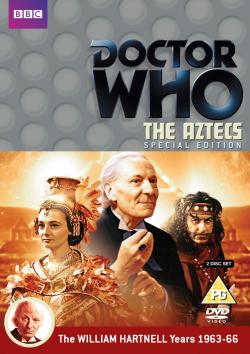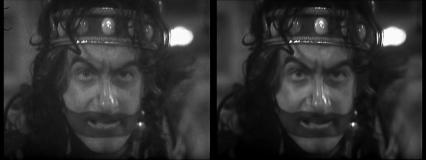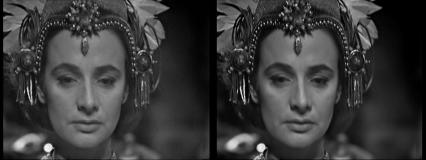The Aztecs SE

The Aztecs SE
Written by John Lucarotti
Directed by John Crockett
Broadcast on BBC1: 23 May 1964 - 13 Jun 1964
DVD release: 11 Mar(R2), 12 Mar(R1)
Back in the mid-1980s, the stories of William Hartnell were something that I knew little about. I'd had the chance to see the original Doctor in action with the wonderful repeat of An Unearthly Child in 1981 - plus the glimpses of him in The Three Doctors and The Five Doctors - but other than that all I had to go on was the way in which he was depicted from the Target novelisations. The Aztecs was published in this format in 1984, but a year later you could imagine my excitement when the story about the Doctor's encounter with that ancient culture actually arrived on my lap!
Perhaps this is something those of the Cheques, Lies and Videotapes era will appreciate more, but back then with the VHS range only just finding its feet it wouldn't be until 1989 that the First Doctor was to be finally acknowledged with the release of The Daleks, so perhaps unsurprisingly I immediately fell in love with my first proper experience with old-school Doctor Who. Okay, so the picture wobbled and the sound warbled, but it was Hartnell and Co actually there on my television!
Some years later (and a multitude of Hartnells since), a "proper" VHS arrived to replace this god-knows how many generation copy, and I was able to fall in love with the story once again, as the beautiful sets were now visible in all their glory and the sparkling dialogue delivered without an "anti-autotuning" effect! Flash-forward to the 21st Century and the story is the first Hartnell adventure to receive the DVD treatment - and the 'soft focus' of VHS was banished into the past with a restored print delivered which included some new-fangled process called VidFIRE ... and suddenly the fantastic backgrounds turned into ... erm ... obvious backdrops with even the corners visible. I must admit I was very disappointed with that, as I felt this was taking a step backwards and taking some of the magic away from the story I had first encountered in my youth, and - like "the hand of Sutekh" - once you're aware of it your eye is unerringly drawn to it every time thereafter.
However, even with such production deficiencies now revealed, it wasn't going to diminish my love of this story, and just over a decade later I can fall in love with it once more as BBC Worldwide release the Special Edition ...
You can't change history... not one line!
The TARDIS arrives in a tomb, which history teacher Barbara quickly recognises as being from the Aztec civilisation. Passing into a temple through a secret door, she is captured but mistaken by Autloc, High Priest of Knowledge, to be the former high priest and now resurrected god Yetaxa, as indicated by a bracelet she had absent mindedly tried on. The Doctor, Ian and Susan are believed to be the privileged servants of Yetaxa and so any immediate danger is past. However, Barbara is determined that - as a god - she can lead the Aztecs away from their sacrificial beliefs before the arrival of Cortez and tries to stop a sacrifice - but she fails and in so trying is seen to be false by the High Priest of Sacrifice Tlotoxl ... who then sees it his duty to expose her by whatever means possible ...Episode one sets up the plot nicely for the next three episodes, as Tlotoxl comes up with a variety of schemes to reveal that Barbara is not who Autloc believes her to be, and is not adverse to putting her companions at risk in order to do so. Barbara demonstrates that she is more than capable of countering his attempts, though ultimately the odds are of course weighed in his favour. Jacqueline Hill is able to shine throughout, with her portrayal of Barbara's frustration over the Doctor's continual assertions she will fail and the confrontations with Tlotoxl leading to some of the best scenes in the story.
The ignorance of characters as to what is happening elsewhere is used to others' advantage several times during the course of the tale. Ian's knowledge of pressure points to defeat Ixta embarrasses the warrior leader to quite happily use nefarious means to best his rival in combat - and tricks the Doctor into giving him the means to do by promising his father's plans for the Temple which he doesn't actually have. Then the Doctor is later captured for speaking to Barbara as he didn't know nobody was allowed to approach her. Susan brashly talks about choosing her own husband in contrast to the Aztec way, little knowing that her lack of understanding of the wishes of The Perfect Victim would lead to severe punishment - and Barbara agrees to this not knowing who the punishment is for.
Two characters are above all these schemes, and sadly they are the ones who come out the worst after their encounter with the TARDIS crew. Autloc only wishes his culture to become enlightened, but discovers that his trust and support in Barbara to achieve this is badly misplaced, forcing him to challenge his own beliefs and ultimately turn his back on everything he knew. Meanwhile, Cameca succumbs to the Doctor's charms as he gently manipulates her to help achieve his goal of getting back into the tomb, and then having mistakenly accepted her romantic overtures ultimately has to break her heart.
William Hartnell continues to bring the manipulative nature of the Doctor to life, though steadily becoming more mellow as the first year progresses. His highlight has to be the moment when the Doctor discovers he's just got engaged, and then how he casually remarks upon his new status to Ian a little later on. The final moments in the tomb as the Doctor decides to keep Cameca's brooch are also handled extremely well - it's easy to forget how experienced an actor Hartnell was with all the doddery, Billy-fluff nature that is often associated with his portrayal, but here in The Aztecs he ably demonstrates how to dominate a scene.
William Russell continues to portray Ian as someone who is capable of taking everything in his stride, and here also get to demonstrate an ability to fight in both armed and unarmed combat - I almost expected him to go "Hai!" at one point when he appears to use Venusian aikado! Sadly, Carole Ann Ford doesn't have that much to do, but then it was her turn to have holiday time during production so that isn't so surprising. Of the main guest stars, John Ringham manages to tread that very delicate line just above moustache-twirling villainy to create a convincing zealot in Tlotoxl, whilst Keith Pyott similarly gives Autloc a believable air of naivety. Ian Cullen's Ixta comes across a little 'wet' for someone who is meant to be the best warrior in Aztec society, though - it isn't his fault that of course fight sequences are going to be choreographed carefully to ensure actors aren't hurt, but it's a shame he made it look too 'polished' at times. On the other hand, what can I say about Margot van der Burgh other than she was lovely!
Production-wise, both the costumes (Daphne Dare) and sets (Barry Newbery) look wonderful. It was interesting to find out from the production notes that Newbery referenced a documentary about Mexico from 1960 that featured Aztec buildings in order to make things as authentic as he could - and that its writer/presenter Joan Rodker was brought on as a researcher for The Aztecs itself! No wonder it all looked so good. Writer John Lucarotti was able to bring the culture to life too, with plenty of historical references inserted into dialogue to meet the early education remit of the series - though this being 1964 of course, new evidence has since come to light that wasn't known back then (like the role of the wheel in Aztec society). Mind you, none of the great names were to be heard during the story, with only Tlaloc the rain god getting name-checked - apparently this was so the cast wouldn't keep stumbling over the likes of Quetzalcoatl and Huitzilopochtli and cause countless retakes (though I thought Tlotoxl was a bit daring!).
Music-wise, the production got a coup with classical composer Sir Richard Rodney Bennett, with producer Verity Lambert mentioning on the commentary that this was a stroke of luck through him being known by director John Crockett - though apparently Sydney Newman wasn't quite so impressed!
The DVD:
The restoration is the main "selling point" for these special editions, and The Aztecs doesn't disappoint in that area. The overall quality has taken another leap forward, with modern restoration bringing an even crisper image than the 2002 innovations had provided; improved contrast has also enabled the foreground characters to stand out further and seem less "in the shadows" than before - though it isn't until you compare the old release with the new one that this sort of thing becomes apparent! Shown here are a few comparisons between the 2002 and 2013 releases:There's no new making-of documentary for this release, as the original covered this area quite well with the features Remembering the Aztecs with actors John Ringham (Tlotoxl), Walter Randall (Tonila), and Ian Cullen (Ixta), and Designing The Aztecs with Barry Newbery. (As an aside, both these features and the commentary on the story itself bring home how time moves on, as since those recordings we lost both Ringham and Randall in 2008, Verity Lambert in 2007 and, though not involved in these features, Sir Richard Rodney Bennett last year - sadly, this is going to be even more painfully felt as we reach the forthcoming Pertwee releases this summer.)
There are new production notes for this release, however, which this times sees Matthew Kilburn as our guide as he delves into the story of production and relates fun facts and figures. How did David Whitaker describe time travel? What influences did Richard III and Hamlet have on characterisations? What do we now know of Aztec culture that was unknown in 1964? All this and more and be found within!
Disc one retains the excerpt from a 1970s Blue Peter, which features Valerie Singleton on location amongst the Aztec ruins as she relates the story of the Aztec leader Montezuma and how he mistakenly thought Cortez as the resurrected god Quetzalcoatl until it was too late. This acts as a nice introductionary compliment to a full documentary, The Realms of Gold, that is on disc two. Presented by John Julius Norwich, the 1969 edition from Chronicle examines Cortez's 1519 arrival in Mexico in much greater detail, explaining how the influence, Christian belief and foreign diseases brought by the Spanish conquerors had such a devastating effect upon Aztec culture and civilisation within just a mere couple of years. (It was also great to hear music from Delia Derbyshire. too!)
The second instalment of Doctor Forever! to be released, Celestial Toyroom, delves into the world of Doctor Who toys. Again narrated by Ayesha Antoine, the feature explores the variety of toys from the early days of fresh 1960s Dalekmania (with Richard Hollis of product licensing) through to the ever increasing retro range from Character Options (discussed by product development director Alisdair Dewar), and along the way drops in on the slightly awry 1970s Denys Fisher figures, the 1980s accurate model-work from Sevans, and perhaps the more infamous range of figures from Dapol. Participants include writers Jim Sangster, Rob Shearman, Paul Cornell, Mark Gatiss and Steve Cole, plus BBC AudioGo producer Michael Stevens and former BBC product approver Dave Turbitt all enthusing over toys they have loved past and present. A host of other items are mentioned, which include discussion of the 70s "pleasure products" from Shearman, the Weetabix action cards by Cole (I still have mine!), and Tom Baker underpants (which a friend of mine has dared to take out in public!). Russell T Davies also recalls that he once thought he could own every piece of new series merchandise. Plus, the original Top Trumps make an appearance, including a brief game between Antoine and Ian McNeice - who also chatted about the process of becoming a Character figure of his own! All-in-all this feature was a lot of fun, with some laugh-out-loud moments!
Other new features include Clive Dunn appearing as "Doctor Fotheringown" in what is considered to be Doctor Who's first spoof, from It's A Square World originally broadcast on New Year's Eve 1963; plus, a behind-the scenes look at the second Aaru film Daleks' Invasion Earth 2150 A.D. which also features director Gordon Flemyng talking candidly on taking on making the film. The other original items from the 2002 release are also present, including the various specially recorded introductions to the story that were required for BBFC compliance back in 'the dark ages'!
Galaxy 4:
The real "selling point" of this DVD, at least for fans, is not so much the spruced up Aztecs but more about the inclusion of the recently recovered third episode of Galaxy 4 - Air Lock. Other than those lucky enough to attend a handful of screenings (or have very long memories!), the majority of fans will be seeing this episode for the very first time! The original recovered print suffered from a number of problems - not least missing its cliffhanger - so this release presents the fully-restored episode in all it glory, including the recreation of the ending. As a bonus, the story as a whole is included, presented as a condensed reconstruction (originally planned for the DVD release of The Time Meddler) that includes especially shot CGI of various planetary scenes and the Chumblies as well the existing clips that had survived from the opening episode.This episode is perhaps the best one to have been found, as it is here where the motivations behind the main protagonists are finally revealed, and how initial conclusions from the first half of the story are turned on their head. We can now witness the Doctor and Vicki's encounter with the Rill, and see the exhaustion that Marga feels written across her face - something which is merely hinted from the soundtrack alone. A fair chunk of the episode (and indeed story as a whole) also involves on-screen activity with little or no dialogue - like when Steven executes his attempted escape plan, or the Doctor attempts to sabotage the Rill device - which at least make more sense now that we can see them taking place - not to mention finally knowing what is making all the various beeps, whistles and other sounds!
However, for me, the excitement was more seeing a "brand new" episode of Classic Who rather than the story itself. Unlike The Aztecs, it is actually a pretty mundane tale, and the Peter Purves-narrated soundtrack released back in 1999 reinforces how padded the story was. Indeed, with the tighter, faster pace brought about by the short reconstruation, the complete Air Lock almost brings the tale to a shuddering halt! Okay, this might seem like sacrilege, but I happened to sit down and watch the recreated Crisis and The Urge To Live from Planet of Giants recently and that revealed how much more effective an edit can make to the pace! For those that would prefer watching the full length episodes from which the DVD recon is derived from, however, searching a well-known place for such things should sate that need (grin).
Conclusion:
As you might have gathered, this is my favourite Hartnell story, and I'd certainly recommend it to anybody who hasn't bought it before. Whether the picture improvements warrant a re-buy for those who have the original release is a matter of preference, though I suspect the inclusion of Air Lock will sway most fans!(However, I still feel the restoration reveals the backdrops far too clearly!)











